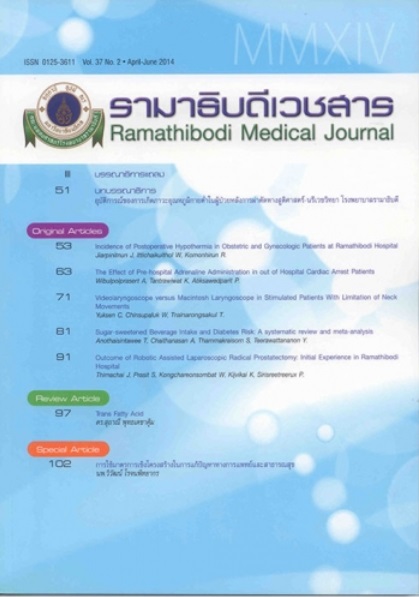The Effect of Pre-hospital Adrenaline Administration in out of Hospital Cardiac Arrest Patients
Keywords:
Adrenaline Administration, Hospital Cardiac Arrest Patients, Advance EMS teamAbstract
Background: Adrenaline has long been proved to increase chance of ROSC in both animal and human studies. Therefore, American Heart Association state in current ACLS guidelines that it must be administered during CPR. However, benefit of adrenaline in pre-hospital settings is still controversial.
Objective: To determine the effect of pre-hospital adrenaline administration in out of hospital cardiac arrest patients.
Methods: Cross-sectional study by analyzing secondary data from National Institute of Emergency Medical Service of Thailand (NIEMS) between January to December 2012. Population include every patients with out-of-hospital cardiac arrest resuscitated by advance EMS team, Dataset of adrenaline administration, operation time and outcome of resuscitation before emergency room arrival were recorded and analyzed subsequently by univariate and multivariate logistic regression analysis.
Results: Total of 1,506 cardiac arrest had been report. Only 512 (64%) patients had complete data for analysis, 424 (82.8%) patients survived to ER. In univariate analysis endotracheal intubation, intravenous fluid, and adrenaline were statistical significantly improve survival to ER. In multivariate analysis only adrenaline and intravenous fluid improved survival to ER with OR 3.32 (95% CI, 1.74 - 6.33) and OR 0.93 (95% CI, 0.90 - 0.96), respectively.
Conclusions: Adrenaline administration significantly increased survival to ER in out of hospital cardiac arrest patients resuscitated by advance EMS team.
References
Boyd TS, Perina DG. Out-of-hospital cardiac arrest. Emerg Med Clin North Am. 2012;30(1):13-23. doi:10.1016/j.emc.2011.09.004.
Sasson C, Rogers MA, Dahl J, Kellermann AL. Predictors of survival from out-of-hospital cardiac arrest: a systematic review and meta-analysis. Circ Cardiovasc Qual Outcomes. 2010;3(1):63-81. doi:10.1161/CIRCOUTCOMES.109.889576.
Berg RA, Hemphill R, Abella BS, et al. Part 5: adult basic life support: 2010 American Heart Association Guidelines for Cardiopulmonary Resuscitation and Emergency Cardiovascular Care. Circulation. 2010;122(18 Suppl 3):S685-S705. doi:10.1161/CIRCULATIONAHA.110.970939.
Herlitz J, Ekström L, Wennerblom B, Axelsson A, Bång A, Holmberg S. Adrenaline in out-of-hospital ventricular fibrillation. Does it make any difference? Resuscitation. 1995;29(3):195-201.
Holmberg M, Holmberg S, Herlitz J. Low chance of survival among patients requiring adrenaline (epinephrine) or intubation after out-of-hospital cardiac arrest in Sweden. Resuscitation. 2002;54(1):37-45.
Wenzel V, Krismer AC, Arntz HR, et al. A comparison of vasopressin and epinephrine for out-of-hospital cardiopulmonary resuscitation. N Engl J Med. 2004;350(2):105-113.
Morrison LJ, Deakin CD, Morley PT, et al. Part 8: Advanced life support: 2010 International Consensus on Cardiopulmonary Resuscitation and Emergency Cardiovascular Care Science With Treatment Recommendations. Circulation. 2010 Oct 19;122(16 Suppl 2):S345-421. doi: 10.1161/CIRCULATIONAHA.110.971051.
Machida M, Miura S, Matsuo K, Ishikura H, Saku K. Effect of intravenous adrenaline before arrival at the hospital in out-of-hospital cardiac arrest. J Cardiol. 2012;60(6):503-507. doi:10.1016/j.jjcc.2012.07.001.
Hayashi Y, Iwami T, Kitamura T, et al. Impact of early intravenous epinephrine administration on outcomes following out-of-hospital cardiac arrest. Circ J. 2012;76(7):1639-1645.
Hagihara A, Hasegawa M, Abe T, Nagata T, Wakata Y, Miyazaki S. Prehospital epinephrine use and survival among patients with out-of-hospital cardiac arrest. JAMA. 2012;307(11):1161-8. doi:10.1001/jama.2012.294.
Ong ME, Tan EH, Ng FS, et al. Survival outcomes with the introduction of intravenous epinephrine in the management of out-of-hospital cardiac arrest. Ann Emerg Med. 2007;50(6):635-642.
Jacobs IG1, Finn JC, Jelinek GA, Oxer HF, Thompson PL. Effect of adrenaline on survival in out-of-hospital cardiac arrest: A randomised double-blind placebo-controlled trial. Resuscitation. 2011;82(9):1138-1143. doi:10.1016/j.resuscitation.2011.06.029.
Olasveengen TM, Wik L, Sunde K, Steen PA. Outcome when adrenaline (epinephrine) was actually given vs. not given - post hoc analysis of a randomized clinical trial. Resuscitation. 2012;83(3):327-332. doi:10.1016/j.resuscitation.2011.11.011.
Jacobs I, Nadkarni V, Bahr J, et al. Cardiac arrest and cardiopulmonary resuscitation outcome reports: update and simplification of the Utstein templates for resuscitation registries: a statement for healthcare professionals from a task force of the International Liaison Committee on Resuscitation (American Heart Association, European Resuscitation Council, Australian Resuscitation Council, New Zealand Resuscitation Council, Heart and Stroke Foundation of Canada, Inter American Heart Foundation, Resuscitation Councils of Southern Africa). Circulation. 2004;110(21):3385-3397.
Ong ME, Tan EH, Ng FS, et al. Survival outcomes with the introduction of intravenous epinephrine in the management of out-of-hospital cardiac arrest. Ann Emerg Med. 2007;50(6):635-642.
Downloads
Published
How to Cite
Issue
Section
License
Copyright (c) 2014 By the authors. Licensee RMJ, Faculty of Medicine Ramathibodi Hospital, Mahidol University, Bangkok, Thailand

This work is licensed under a Creative Commons Attribution-NonCommercial-NoDerivatives 4.0 International License.













